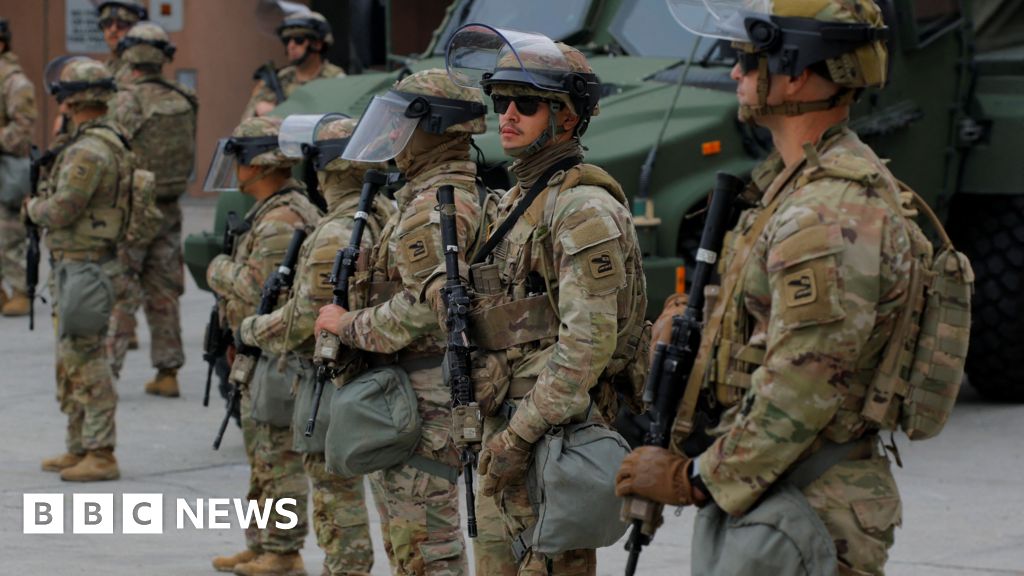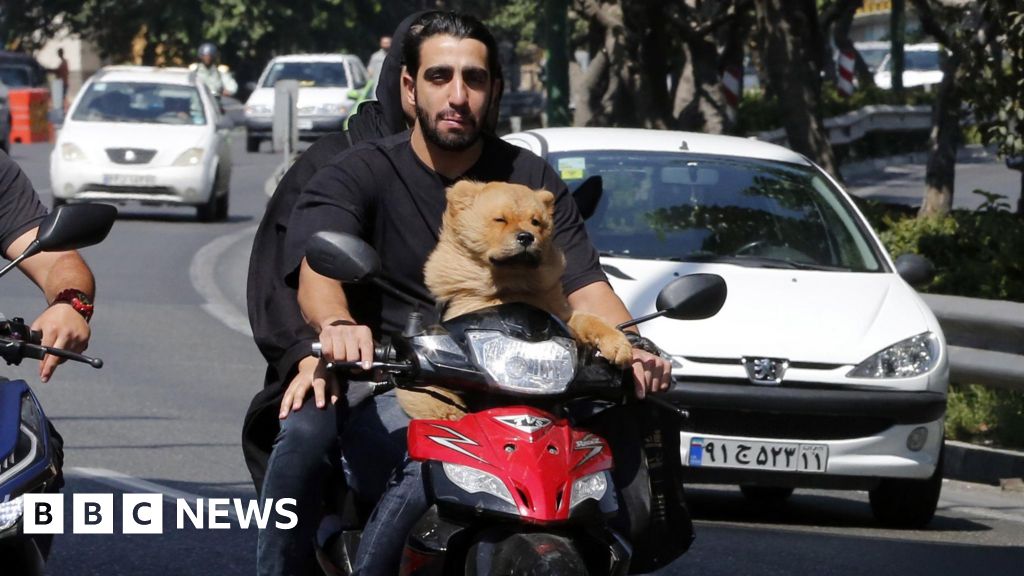ARTICLE AD BOX
By Jeremy Bowen
BBC News, Bakhmut
Image source, BBC/Jeremy Bowen
Image caption,Three months a soldier - Maxsym Lutsyk, who has put university on hold to fight
Maxsym Lutsyk looks older and more serious, and makes fewer jokes, than when I saw him in the days after Russia's invasion of Ukraine. Back then, the 19-year-old had just put university on hold and volunteered to fight.
Last week he made a difficult journey out of the Donbas front line, using back roads at night to avoid artillery fire, to pick up supplies for his unit and to tell me what it has been like fighting the Russians.
We met in Bakhmut, a small town well within the range of Russian artillery. Some of its buildings are in ruins and the city has been almost emptied of civilians.
For three weeks, Maxsym and his comrades had fought to keep control of a position they called Serber, after a small dog they had adopted. It was in a smashed-up former factory in Rubizhne, a town that eventually fell to the Russians.
"It was like hell. There were no good positions to defend. We had been in trenches, sometimes shelters from Soviet times, and a fire station."
His unit was targeted by tank fire about 25 times a day, he says.
"One of my friends was killed there and maybe 10 or 15 guys were injured seriously."
Student signing up
Now, summer is almost on them and Ukraine's fertile black soil is bursting with life, the deadliest fighting is in Donbas. Russia's generals are learning from its enemy's victories around Kyiv, the capital, and Kharkiv, the second city.
Defeat in March led the Russian army to fall back, in April and May, on what it knows best. Its forces and fearsome firepower are concentrated in a narrow sector of east Ukraine. Now it is close to forcing Ukrainian forces out of Luhansk, one of the two regions that make up Donbas. The other, Donetsk, where Ukraine has a bigger footprint, is already being hit by Russian artillery.
I first came across Maxsym, a biology student, in early March. He, and his university friend Dmytro Kisilenko, an 18-year-old studying economics, had signed up to fight shortly after Russia launched its invasion.
Image source, BBC/Jeremy Bowen
Image caption,Maxsym (left) and Dmytro (right) on 4 March
As they waited alongside others like them, in the bitter cold, to be bussed to their training centre, they looked like young lads off to a festival or a camping trip, except for the old Kalashnikovs they had just been issued. Witnessing 18- and 19-year-olds, full of the invincible sense that young men have, going to war in Europe, just as they had during the blood-soaked years of the 20th Century was moving, depressing, and alarming. It was a sign of the big war that was coming.
In March, Maxsym and Dmytro and all Ukrainians were adapting, the way human beings always do in war. After the first shock old lives and routines fade into a new, all-consuming version of real life. During their brief training early in March, we talked about how the war was changing everything. Maxsym already sounded old for his years.
"We can't meet our wives, our girlfriends, our children. We can't do our business, like we were doing before the invasion. But everyone understands that we have a more important mission now. And we will continue doing business, growing up our children. We will kiss our wives and girlfriends many times, but after the war."
Their lives, those of every Ukrainian, were turned upside down, when the Russians invaded on 24 February. So have the lives of all of us who aren't Ukrainian.
Despite Russian advances, Maxsym retains an iron-clad determination to fight. His friend Dmytro, who fought in the battle for Kyiv, is remains in the capital. As they were students, service in the Donbas is not compulsory.
Image source, BBC/Jeremy Bowen
Image caption,Friends going in their separate ways: Maxsym, left, and Dmytro
"As long as it's necessary to hold, we are ready to freeze in trenches, to lose our hearing. We are ready even to die there, but we will win as much time as it's necessary for the entire civilized world to beat Russia in non-military ways."
He has no time for people calling themselves Ukraine's allies, who say they should trade territory for some kind of accommodation with Vladimir Putin's Russia.
"I think that there is no way to make a deal with Putin. Putin understands only the language of bullets, blood, war crimes and something else. It is impossible to say take this part of the land and the war will end."
I asked Maxsym how the war was changing him. At the start of the year, he was arranging concerts and involved with youth politics in Kyiv.
"Even now I can't answer you exactly because it is very hard to understand that some of your friends, they died in your arms. It is hard to live with that fact... and when we left Rubizhne, it was hard for us to understand that we have lost the battle for this factory; for one of the key cities of Luhansk region."
'War of light and darkness'
Back in March, Maxsym used to joke that he hadn't told his parents exactly what he was doing in uniform.
"Now my parents understand me 100%. I try to call them every time I can. My mama sent some uniform for me and my brothers." His father tried to join the territorial defence in Maxsym's home town, Sumy. "But he's 65 and too old to fight. So when they turned him down, he phoned me and says 'Maxsym, can I become a part of your unit?'
"They understand me. They support me mentally and financially."
Donbas is full of signs that the Ukrainians expect to lose more territory to this Russian offensive. New lines of trenches have been dug in the rear. Convoys of huge, expensive tractors are being driven west. The sophisticated heavy weapons that they need to try to match and even outgun Russian firepower are arriving, but not fast enough yet to force the invaders back.
Maxsym the student has turned into a front-line soldier, engaged he believes in the mission of his life.
"We are fighting for the freedom of the entire world, the entire civilised world and if anyone thinks it is a Ukrainian-Russian war, it isn't. It is the war of the light and the darkness between the Russia and the entire world."

 3 years ago
67
3 years ago
67








 English (US) ·
English (US) ·